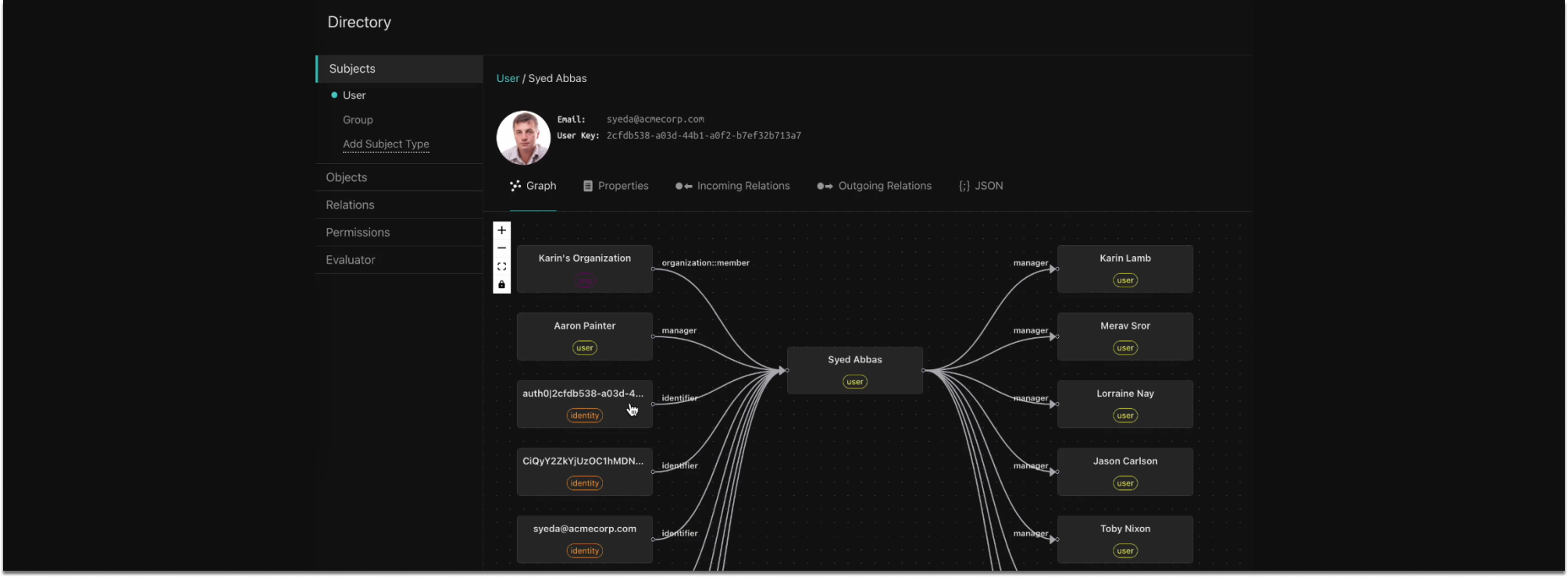Product Pulse #5: Graph Visualizer, Java SDK, and new self-hosted options

Over the past several weeks we’ve rolled out a few new features and enhancements to the Aserto authorization platform, which we are excited to share with you. These new improvements include a graphical visualization of our directory graph, first-class support for Java backends with a Java SDK, and the ability to self-host the Aserto Console and Aserto Directory.
The Graph Visualizer makes it easy to explore the Aserto Directory graph by navigating from subjects to objects through relationships. It lets you see all the groups that a user is a member of, all the members of a certain group, the permissions that users have over specific resources, and things like that.
The Java SDK provides seamless integration with Java applications, and completes our SDK library that now supports every popular programming language. Lastly, the self-hosted options provide users with more flexibility and control over their identities, data, and authorization logic.
Graph Visualizer: Understand your directory and visualize policies
It’s crucial to have a clear understanding of your authorization system and policies. The Aserto Graph Visualizer displays the relationships and dependencies between your users, resources, policies, and permissions in an intuitive and interactive graphical interface. You can explore the directory by expanding or collapsing nodes, zooming in and out, and even searching for specific users, resources, or relationships.
The Graph Visualizer enables you to gain deep insight into the relationship graph, and make informed decisions about your access control system.
Aserto Java SDK: Simplifying Authorization for Java Applications
Our Java SDK is designed to make integrating fine-grained authorization capabilities into your Java applications a breeze. It enables you to seamlessly implement Aserto’s authorization platform to enforce fine-grained access controls for your Java apps, and ensure consistent and secure access to protected resources.
The Java SDK enables you to future proof your Java applications with built-in support for every authorization model: RBAC, ABAC, PBAC, and ReBAC. Follow this step-by-step developer guide to try it for yourself by adding Aserto authorization to a todo application with a Java backend.
Self-hosted Console and Directory
As part of our commitment to providing flexibility and control, we are excited to introduce new self-hosted options for the Aserto Console and Directory. You can now host the Aserto Console and Directory in your cloud or on-prem container management system. This allows you to maintain full control over your authorization data, infrastructure, and identities to ensure compliance with your organization's security and privacy requirements.
Leverage the Aserto Console for a centralized view of users, policies, data, relationships, and authorization decision logs. The Aserto Directory is where you securely store and manage the information you need to make access decisions (user, resource, and environment context).
We are currently looking for users to provide feedback about these self-hosted capabilities. Drop us a line if you are interested.
Conclusion
We are thrilled to share these updates with you! We will keep you posted as we continue to enhance the capabilities of the Aserto platform to provide organizations with more options to secure their applications and further control over their authorization systems.
As a recap, the three features we announced in this post are:
- Graph Visualizer that adds the ability to effortlessly explore your directory graph to better understand relationships between users and resources, and detect misconfigurations.
- Java SDK to enable a seamless integration of the Aserto platform with Java applications. Aserto now officially supports every popular engineering language and framework.
- Self-hosted Console and Directory so that you can deploy them in your environments. This is just another step in providing organizations with complete control over application authorization. If you are interested in providing feedback about these self-hosted options, drop us a line.
As always, we’d love to hear what you think. Join our community Slack to share your feedback, interact with other users, and ask us any question you might have.
Related Content

Introducing ds-load
Introducing ds-load, a powerful tool that simplifies the process of extracting, transforming, and loading data from upstream sources, such as an identity provider, into the Topaz directory.
Aug 31st, 2023

Product Pulse #6: Aserto supports Active Directory and LDAP
We’re excited to announce that as of January 2024, Aserto and Topaz fully support LDAP as a source of users and groups! The integration has been tested with the leading two implementations of LDAP - Active Directory and OpenLDAP. Read all about it in this post.
Feb 7th, 2024

Product pulse #7 - Authorization Templates and Directory Assertions
The Aserto team has been hard at work improving Topaz and the Aserto SaaS platform. We’re excited to share a few of the new product features, including authorization templates and assertions. Let us know what you think!
Mar 29th, 2024
&color=rgb(100%2C100%2C100)&link=https%3A%2F%2Fgithub.com%2Faserto-dev%2Ftopaz)


